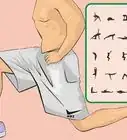This article was co-authored by Amber Rosenberg, PCC. Amber Rosenberg is a Professional Life Coach, Career Coach, and Executive Coach based in the San Francisco Bay Area. As the owner of Pacific Life Coach, she has 20+ years of coaching experience and a background in corporations, tech companies, and nonprofits. Amber trained with the Coaches Training Institute and is a member of the International Coaching Federation (ICF).
wikiHow marks an article as reader-approved once it receives enough positive feedback. This article received 18 testimonials and 95% of readers who voted found it helpful, earning it our reader-approved status.
This article has been viewed 475,892 times.
In today's world, coping with job-related pressure is really tough. Anyone who's held down a full-time job knows that an average work day is not always long enough to get everything you need to do done. However, your productivity can be greatly improved by adopting habits designed to make you work more efficiently. An efficient worker uses the most of each minute of the day, giving his or her fullest attention to the most important tasks first. Being efficient at work won't just improve your productivity and win you points with your boss - it'll also make you feel accomplished, satisfied that you've had a full and productive work day.
Steps
Creating Focus
-
1Keep a clean, orderly work space. Achieving efficiency at work can sometimes be as simple as clearing the clutter from your work area.
- A disorderly work area is a work area that can hinder your productivity. If you're constantly struggling to find specific tools or documents in a mountain of clutter, serious work time is being wasted. Only keep items that you use daily out and about - everything else should be squirreled away where it's out of the way but also quickly.
- If you work in an office, arrange your office space and desk so that you can quickly and easily find whatever you need to work. If you don't work in an office, the same principles still apply. For instance, if you work in a bike repair shop keep your tools clean and organized so that you'll be able to find them instantly when you need them. Almost every work area benefits from being kept clean.
- Office workers and other people who handle large numbers of documents should create a filing system that is logical and organized. Keep documents that you use frequently close at hand. Stash other documents according to alphabetical (or some other logical) order.
-
2Keep your workplace well-stocked. Make sure that you have the supplies and tools needed to do your job. In an office, this means you should have things such as hole-punches, staple removers, calculators, etc. at the ready. Outside of an office setting, the tools are different, but the fundamental principles are the same - have the things you need to work effectively before you have to start working. Scientists working with complex graphing applications and mechanics working with socket wrenches will both benefit from having their tools prepped and ready beforehand.
- This also means to make sure you have a good supply of whatever consumable supplies your job requires - staplers need staples, carpenters need nails, teachers need chalk, etc.
- Ensure your tools are well-maintained. One essential broken tool can bottleneck the rest of your work flow if you can't proceed without it! Save time in the long run by spending a few moments periodically to clean and maintain your tools.
Advertisement -
3Keep a consolidated schedule. If you've been flying by the seat of your pants so far, making any sort of effort to plan out your day will probably increase your working efficiency. To keep a truly effective schedule though, limit yourself to one comprehensive planner (optionally supplemented with one calendar in your office or cubicle for long-term objectives.) Don't needlessly complicate your work by keeping more than one schedule or by scrawling out a huge collection of notes that you'll inevitably lose. You want to be able to look in one specific place to see what you need to do.
- Organize each day by creating a "to do" list. Begin with the highest priorities of the day so that they are most likely to get done. Put less important tasks at the end the list. Start at the top of the list at the beginning of your work day. If you do not complete the list by the end of the day, tackle the uncompleted items the next day.[1]
- Set a time frame and deadline for your most important projects, and be realistic about the length of time they will take. You don't want to set yourself up to fail - it's better to ask for more time at the start of a project, rather than right before it's due.[2]
-
4Eliminate your personal distractions. Different work places have different distractions - some jobs may come with a particularly talkative coworker who just won't leave you alone. Others might be oppressively silent, causing you to get distracted by even the quietest noises. Do what you must to make sure you can stay focused on your work. If your job allows you to safely listen to music, take an MP3 player to work with you. You might even consider posting notes at your work station notifying coworkers not to distract you. It might seem rude, but it's not - it's a reasonable and effective method to get people to leave you alone while you're working. Remember, you can socialize to your heart's content during breaks and meals.
- One very common distraction is spending time on recreational internet sites. One study showed that about two thirds of workers waste at least a little time on websites not related to their work every day. [3] Luckily, most browsers allow you to download free productivity aids that allow you to block problem websites. Search your browser's extension store for "website blocker" or "productivity aid." You're likely to get at least a few free, effective results.
- Other good ways to avoid distraction are by screening your calls (to avoid needless telephone conversations) and minimizing drop-in meetings.
-
5Use breaks to handle personal business. Oddly, breaks can increase, rather than hinder your workplace efficiency. First, breaks offer you much-needed rest. Without this rest, you may become fatigued, working more slowly or with less proficiency. Second, breaks give you a chance to deal with your distractions. Use your breaks to do everything that might otherwise take you away from your work. Do you find yourself daydreaming about a relative you've been meaning to call when you should be working? Call them on your break, eliminating your distraction!
Enacting Effective Work Strategies
-
1Break your responsibilities into manageable pieces. Big projects can be intimidating - if they're big enough, it's easy to put them off, wasting time on less-important work until you're forced to tackle the entire project right up against the deadline. As an efficient worker, you should do important work first, even when that means doing a small part of a large task. It doesn't feel as rewarding to do a small part of a big task as it does to complete an entire small task, but it's a smart use of your time. In the long run, you'll finish your most important tasks faster if you work on them a little bit every day.
- For example, if you've got to make a big presentation in one month's time, set a goal of creating an outline today. It's not terribly time-consuming, so it won't distract you from your other work, but it's an important first step that makes the rest of the process quicker and easier to complete.
-
2Lighten your work load by delegating work. Unless you're at the very bottom of the workplace totem pole, you may have the opportunity to split up particularly repetitive tasks among one or more of your subordinates to save yourself time. Don't give your underlings projects that only you know how to complete satisfactorily. Instead, give them the time-consuming, monotonous tasks that keep you from using your talents on more important work. If you delegate work, remember to follow up with your assistant and give him/her a deadline. Always be gracious with your subordinates when they help you - if they feel like you appreciate them, they'll work hard for you on future projects.
- If you're an intern, an entry-level employee, or someone else who's low-ranking in your company, you can still try to divide particularly monotonous work with employees who are at the same level as you (with their permission as well as the permission of your supervisor, of course). If you use a coworker's help, be ready to return the favor![[Image:Be More Efficient at Work Step 07Bullet01.jpg center
- If you've got a great relationship with your boss, you can even see if he can delegate some of the work to others for you![[Image:Be More Efficient at Work Step 07Bullet02.jpg|center
-
3Keep meetings lean. There's a reason everyone hates meetings - according to a 2012 survey, almost half of all respondents consider meetings to be the biggest source of wasted time at work - bigger, even, than time spent on personal and recreational websites. Meetings can be vital for discussing goals and establishing a forward vision. Left unchecked, however, meetings all too often become bloated affairs, eating up hours (or in extreme cases, even days ) of your time without anything important being decided. Here's a few tips to make your meetings as effective as possible:
- Establish an agenda before every meeting so that the time set aside is used to its full potential. Include time frames in which certain topics of discussion should be addressed. Stick to your agenda as much as you can - if other topics arise, recommend they be discussed later via a one-on-one office discussion.
- Invite the smallest number of people as possible. Keeping your meetings to the bare minimum in terms of attendees reduces the chance that the conversation will veer off-topic. It also keeps everyone who doesn't need to be there at their desks, working, which is overall more productive.
- Keep slide presentations to a minimum. There is ample debate about whether slide presentations (PowerPoint, etc.) help or hinder the efficiency of a meeting.[4] This much is clear: If you use slides in your presentation, keep them as concise and informative as possible. Use slides to display pictures and data that can't be conveyed through your speech, not the entire content of your presentation. And don't mess around with animations or transitions, either, as it wastes time.
- Finally, as an overarching principle, know what you want to decide before you start the meeting and make that decision as quickly as possible.
-
4Nip office drama in the bud. Workplaces can, unfortunately, be terribly stressful places. If tempers flare, address any ill will immediately and directly. This may mean you, the person you're fighting with, or both of you need to make sincere apologies. Do this sooner rather than later. If you let a few fights fester into a grudge, your efficiency will suffer in the long run as you waste time working around this person and avoiding him/her in the workplace. More importantly, you'll be miserable - don't let workplace drama ruin your efficiency and your mood!
- Don't be afraid to involve a mediator. Businesses know that drama and hurt feelings can hinder work flow, so many employ people whose specific duties include resolving workplace disputes. Contact your workplace's human resources personnel if you feel frustrated, sad, or scared because of someone else in the workplace.
- When all is said and done, you don't have to be friends with a colleague you've argued with - you just have to be able to work with him or her. Be polite and tactful in the workplace, even with people you hate.
Making Lifestyle Changes
-
1Be well rested. Being tired has never improved the quality of anyone's work. Tiredness can slow your output, dull your performance, and, if you're prone to sleeping spells, seriously embarrass you in important meetings. On top of this, severely insufficient sleep has been correlated with a variety of health problems.[5] Don't fall asleep at your desk or miss work because you've gotten sick - get 7-8 hours of sleep a night to be at your best.
- At best, workplace fatigue can be a minor distraction. At worst, it can be a serious safety concern. If you have a job where peoples' safety is at stake (for instance, if you're an air traffic controller or you drive a semi truck), it's imperative that you keep a good sleep schedule.
-
2Get exercise. Science has shown that a good exercise regimen improves your workplace mood and productivity.[6] This is especially true for sedentary office jobs. If you spend most of your time at work sitting in front of a computer, make special effort to spend a little time every day exercising - not only will it make it easier to sit still at work, but it will make you feel happier, sharper, and more motivated.
- If you're starting an exercise routine for the first time, try a moderate workout combining with some.
-
3Keep an elevated mood. If you're trying to improve your working efficiency, you may be tempted to pursue your work with dogged seriousness. Often, this isn't a good idea - you may increase your efficiency in the short term, but if you never allow yourself any pleasure at work, it's easy to burn yourself out, leading to fatigue, stress, and a lack of motivation. Try to keep high spirits - if you feel good at work, you'll be more likely to stay motivated and ambitious.[7]
- Do small things to improve your mood that won't hinder your productivity - listen to music through headphones, take stretch breaks, or take your laptop to the break room for some peace and quiet.
- Make the most of your meal breaks - relish the chance to enjoy good food and tell jokes with your workplace friends.
- Use coffee with caution. Coffee can be a fantastic pick-me-up on days when you're feeling especially drained, but if you use it every day, you'll become dependent on it and it will cease to give you any benefits.
-
4Motivate yourself. It's easier to work efficiently if you have a good reason to work. If you're occasionally having difficulty getting yourself going, think about the reasons that led you to your job in the first place - your life's goals, your dreams, and your vision for yourself. Try to think of your work as a means to an end - the "end" being your ideal vision for your life. If you enjoy your job, try thinking about how your work makes you feel - do you feel fulfilled and accomplished after you've done it?
- Think about the good things your work allows you to have. Perhaps you owe your house or your car to the money you've earned through your job, or maybe your job allows you to send your children to school. Also think of your job's "benefits" - medical and/or dental insurance for your family, for instance.
- Think about the consequences if you don't work. What things will you have to give up if you lose your source of income? In what ways will it affect your family or other people close to you?
-
5Reward yourself. If you've successfully increased your work efficiency, celebrate - you deserve it. It's not easy to lose bad habits and cultivate good ones, so reward yourself for your hard work. Buy yourself a drink after work on Friday, meet with some friends for a night out, or just lay in bed with a book - whatever makes you happy after a long work week, do it. Rewarding yourself increases your feeling of accomplishment, which is an important part of keeping your motivation up.
- Your reward doesn't have to be big or grandiose, and it shouldn't be something that's financially irresponsible. Modest, moderate rewards are best. Save the new Rolex for a special occasion.
Expert Q&A
Did you know you can get expert answers for this article?
Unlock expert answers by supporting wikiHow
-
QuestionHow can I improve my efficiency at work?
 Amber Rosenberg, PCCAmber Rosenberg is a Professional Life Coach, Career Coach, and Executive Coach based in the San Francisco Bay Area. As the owner of Pacific Life Coach, she has 20+ years of coaching experience and a background in corporations, tech companies, and nonprofits. Amber trained with the Coaches Training Institute and is a member of the International Coaching Federation (ICF).
Amber Rosenberg, PCCAmber Rosenberg is a Professional Life Coach, Career Coach, and Executive Coach based in the San Francisco Bay Area. As the owner of Pacific Life Coach, she has 20+ years of coaching experience and a background in corporations, tech companies, and nonprofits. Amber trained with the Coaches Training Institute and is a member of the International Coaching Federation (ICF).
Pacific Life Coach One thing you can do is reorganize your calendar and start chunking your time. This involves sitting down, consolidating all of your to-do lists, and setting aside time for the most important tasks. Add a little extra time to the really essential stuff to give yourself a cushion. This way, you can identify the most important tasks and keep a clear vision of what you need to do. Also, don't forget to practice some self-care! Relax in your off time, do something you enjoy, and get plenty of rest to make sure your batteries are charged for work.
One thing you can do is reorganize your calendar and start chunking your time. This involves sitting down, consolidating all of your to-do lists, and setting aside time for the most important tasks. Add a little extra time to the really essential stuff to give yourself a cushion. This way, you can identify the most important tasks and keep a clear vision of what you need to do. Also, don't forget to practice some self-care! Relax in your off time, do something you enjoy, and get plenty of rest to make sure your batteries are charged for work.
References
- ↑ Amber Rosenberg, PCC. Pacific Life Coach. Expert Interview. 26 February 2019.
- ↑ Amber Rosenberg, PCC. Pacific Life Coach. Expert Interview. 26 February 2019.
- ↑ http://www.forbes.com/sites/cherylsnappconner/2012/07/17/employees-really-do-waste-time-at-work/
- ↑ http://www.thinkoutsidetheslide.com/are-we-wasting-250-million-per-day-due-to-bad-powerpoint/
- ↑ http://www.sleepfoundation.org/article/white-papers/how-much-sleep-do-adults-need
- ↑ http://www.sparkpeople.com/resource/fitness_articles.asp?id=795
- ↑ Amber Rosenberg, PCC. Pacific Life Coach. Expert Interview. 26 February 2019.
- http://lifelearningtoday.com/2007/08/23/25-tips-to-become-more-productive-and-happy-at-work/
About This Article
To be more efficient at work, keep your workspace clean, organized, and stocked with supplies. Try to start each day by organizing a "to do" list that you can refer to throughout the day to keep yourself on task. Breaking up major projects into smaller, more manageable tasks can help you meet your deadlines without feeling overwhelmed, and if you're easily distracted, be sure to put away your cell phone and keep socializing to a minimum! For tips on lifestyle changes that can help you be more efficient at work, read on!
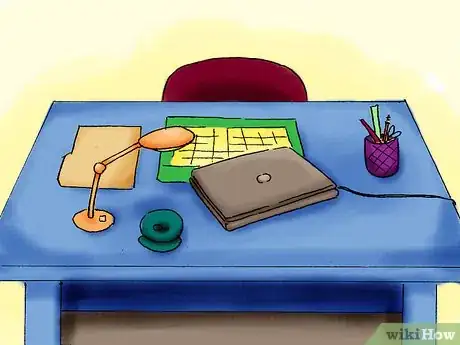
-Step-11.webp)
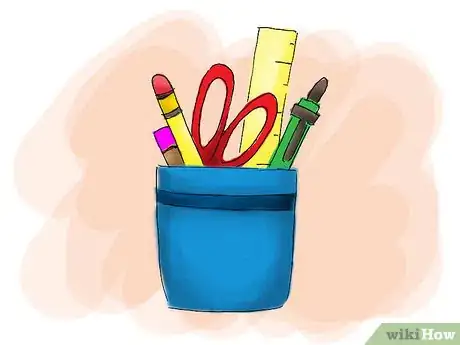
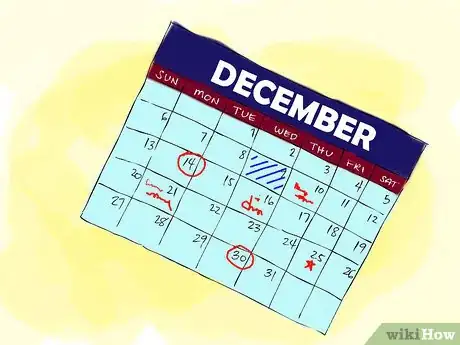

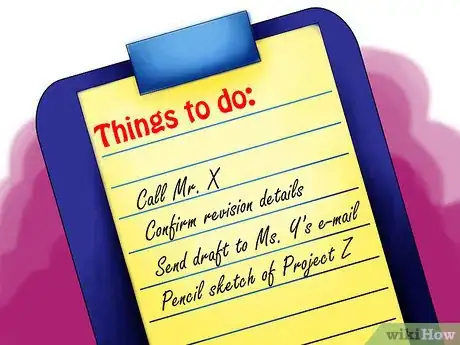
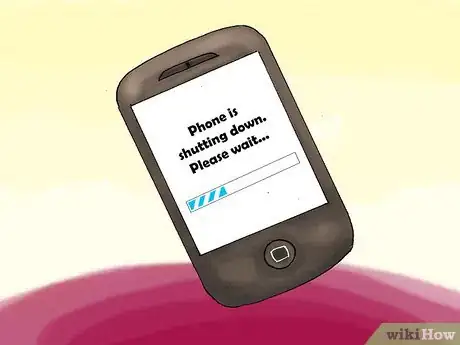
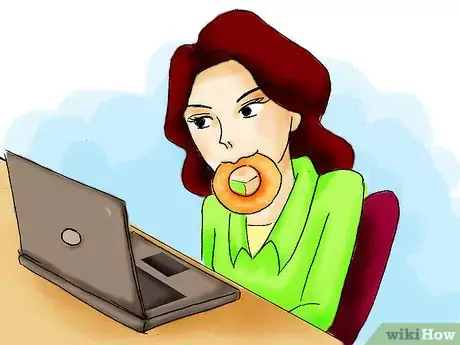


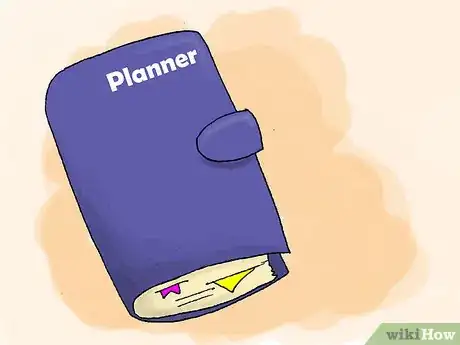





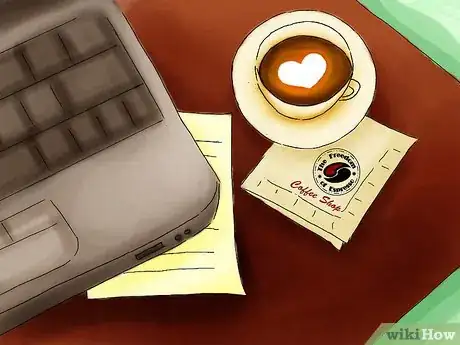



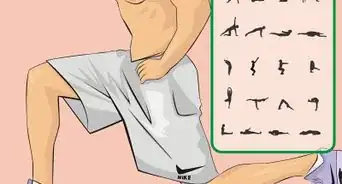

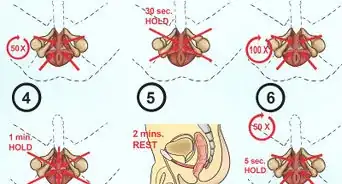


-Step-24.webp)















